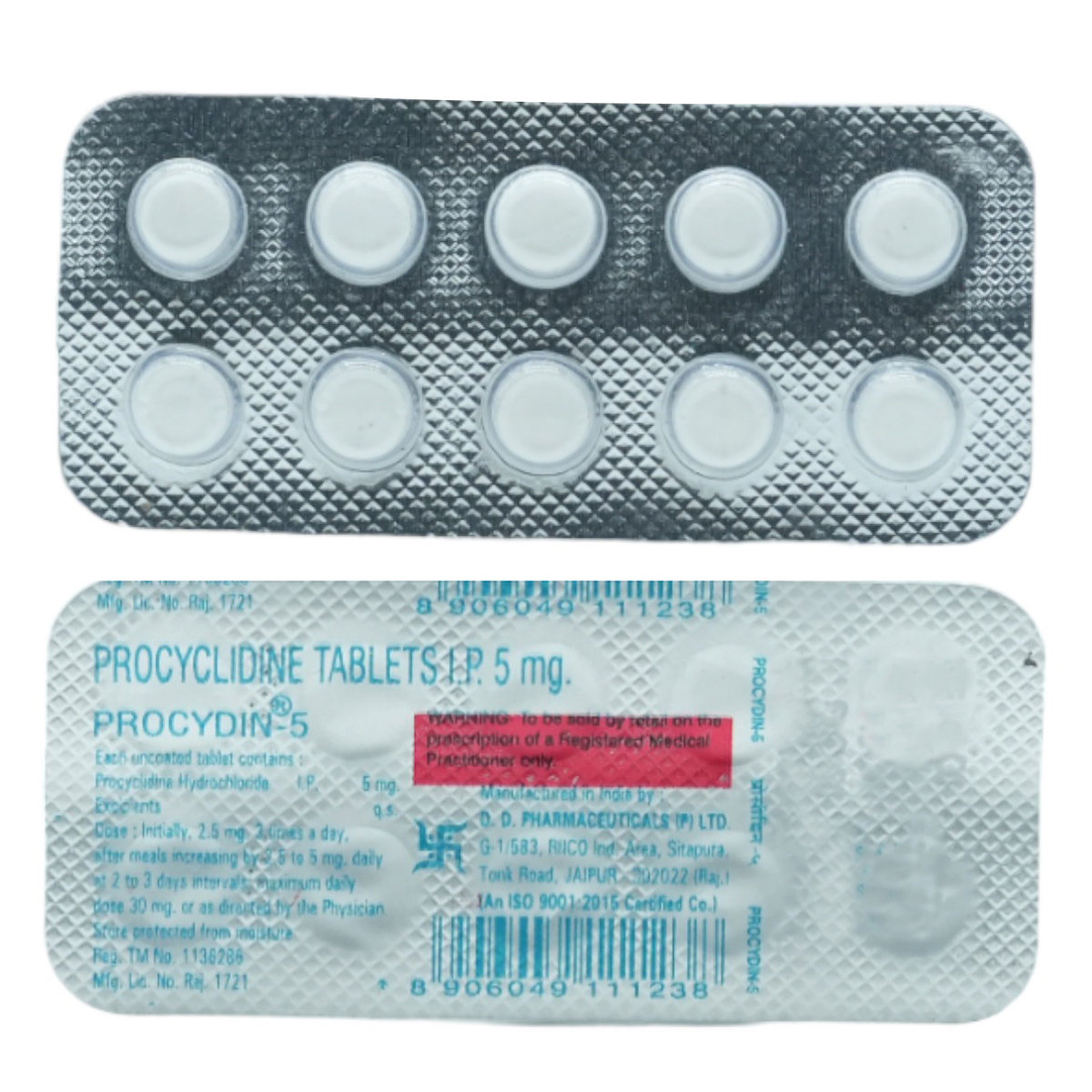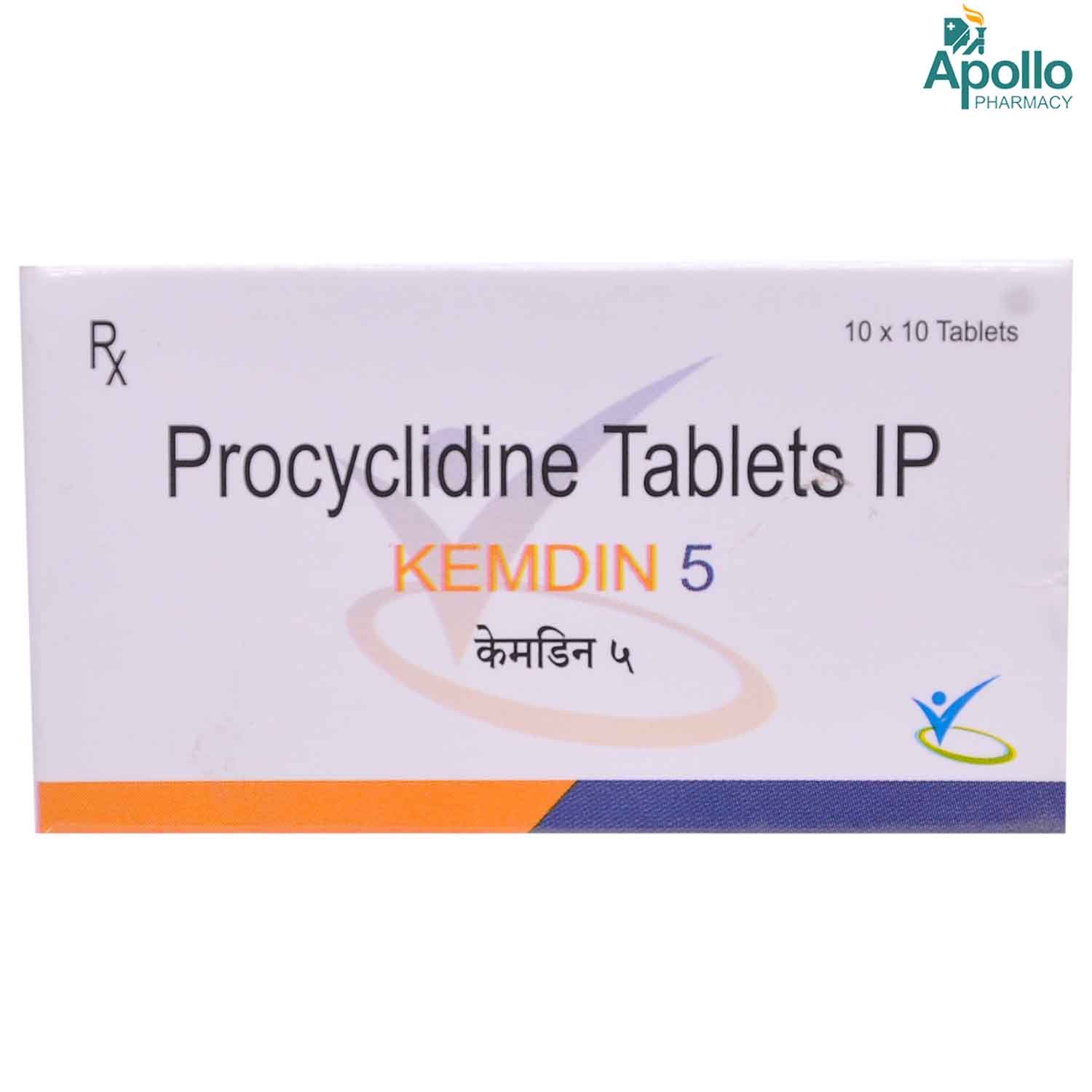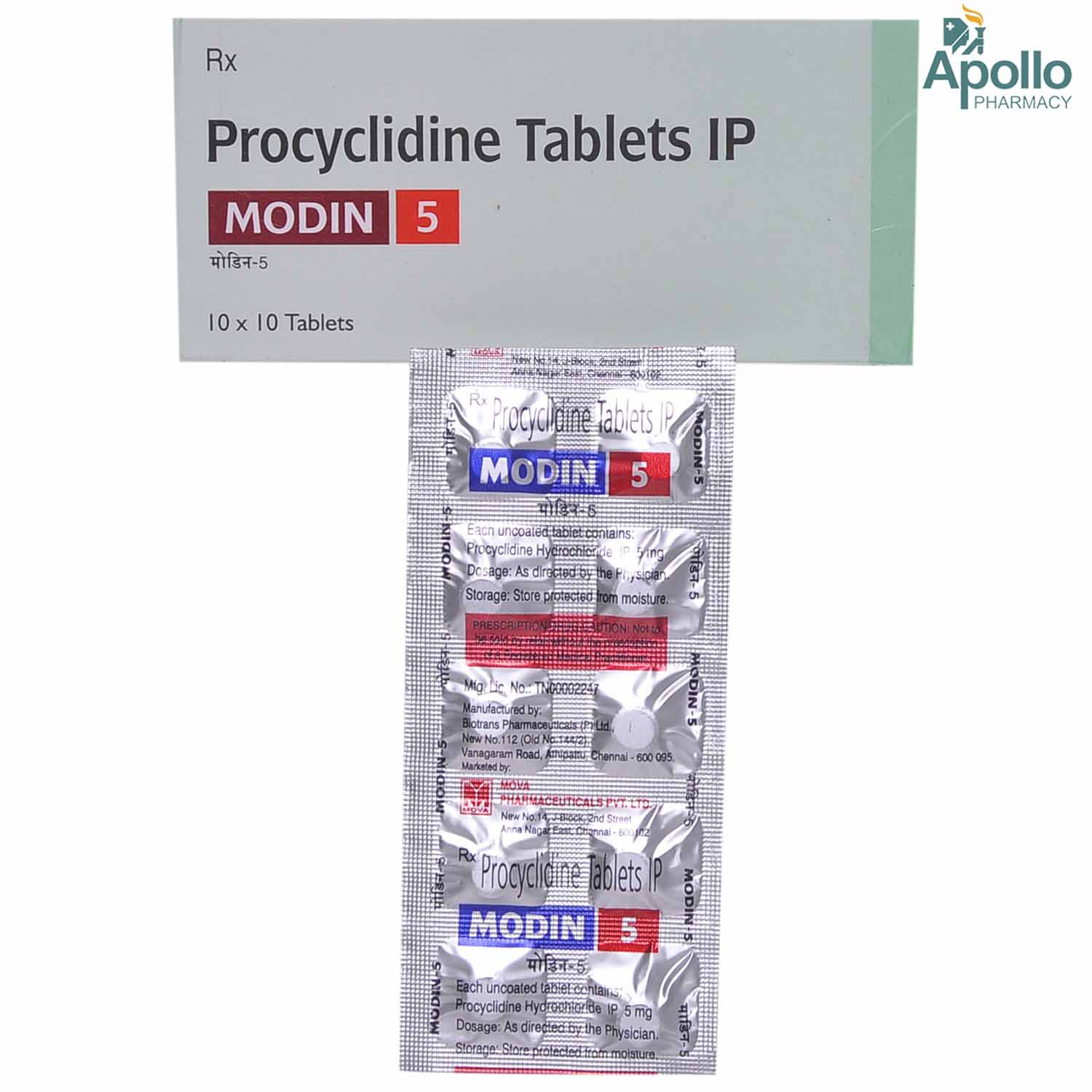Ocyl-5 Tablet 10's
MRP ₹42
(Inclusive of all Taxes)
₹6.3 Cashback (15%)
Provide Delivery Location
Online payment accepted
 Prescription drug
Prescription drugWhats That
Composition :
Manufacturer/Marketer :
Consume Type :
Return Policy :
About Ocyl-5 Tablet 10's
Ocyl-5 Tablet 10's belongs to a group of medicines called anti-spasmodic agents used as an adjunct to treat Parkinson’s disease and extrapyramidal symptoms (drug-induced movement disorders). Parkinson’s disease is a progressive neurological disorder in which the first signs are movement problems.
Ocyl-5 Tablet 10's contains ‘Paliperidone’, which relaxes the muscles and nerve impulses that control muscle functioning. Besides this, Ocyl-5 Tablet 10's also balances chemical messengers called neurotransmitters in our brain, thereby improving muscle control and reducing stiffness, thereby helping the muscles move naturally.
You can take Ocyl-5 Tablet 10's with food to prevent stomach upset. Take Ocyl-5 Tablet 10's as prescribed. You are advised to take Ocyl-5 Tablet 10's for as long as your doctor has prescribed it for you, depending on your medical condition. In some cases, you may experience certain common side effects such as nausea, vomiting, dizziness, constipation, weakness, headache, dry mouth, decreased urination, drowsiness, and feeling nervous or restless. Most of these side effects do not require medical attention and will resolve gradually over time. However, you are advised to talk to your doctor if you experience these side effects persistently.
Do not discontinue Ocyl-5 Tablet 10's on your own. Do not take Ocyl-5 Tablet 10's if you are pregnant or breastfeeding unless prescribed by the doctor. Ocyl-5 Tablet 10's may cause drowsiness and dizziness, do not drive unless you are alert. Ocyl-5 Tablet 10's should not be given to children as safety and effectiveness have not been established. Avoid consuming alcohol with Ocyl-5 Tablet 10's as it could lead to increased drowsiness and dizziness. Keep your doctor informed about your medicines and health condition and rule out any side effects.
Uses of Ocyl-5 Tablet 10's
Directions for Use
Key Benefits
Ocyl-5 Tablet 10's belongs to a group of medicines called anti-spasmodic agents. Ocyl-5 Tablet 10's is used to treat the symptoms of Parkinson's disease and extrapyramidal symptoms (drug-induced movement disorders). Ocyl-5 Tablet 10's exerts a direct inhibitory effect upon the parasympathetic nervous system. It works by relaxing the muscles and nerve impulses that control muscle functioning. Ocyl-5 Tablet 10's improves muscle control and reduces stiffness, thereby helping the muscles move naturally. Ocyl-5 Tablet 10's is used as an adjuvant therapy along with levodopa to treat Parkinson's disease. Additionally, Ocyl-5 Tablet 10's is used to control drug-induced movement disorders caused by CNS drugs such as dibenzoxazepines, thioxanthenes, phenothiazines, and butyrophenones.
- Inform your doctor about dry mouth symptoms. They may adjust your medication regimen or prescribe additional medications to manage symptoms.
- Drink plenty of water throughout the day to help keep your mouth moist and alleviate dry mouth symptoms.
- Chew sugar-free gum or candies to increase saliva production and keep your mouth moisturized.
- Use saliva substitutes, such as mouthwashes or sprays, only if your doctor advises them to help moisturize your mouth and alleviate dry mouth symptoms.
- Avoid consuming smoking, alcohol, spicy or acidic foods, and other irritants that may aggravate dry mouth symptoms.
- Schedule regular dental check-ups to keep track of your oral health and handle any dry mouth issues as they arise.
- Inform your doctor about your constipation symptoms. They may adjust your medication or advise alternative treatments.
- Stay hydrated by drinking sufficient of water (at least 8-10 glasses a day) to help soften stool and promote bowel movements.
- Increase fibre intake by eating foods high in fibre, such as fruits, whole grains, vegetables and legumes, to help bulk up the stool.
- Establish a bowel routine by trying to go to the bathroom at the same time each day to train your bowels.
- Engaging in regular exercise, like walking or yoga, can support in bowel movement stimulation.
- Consult your doctor if constipation persists, and discuss alternative treatments or adjustments to your medication.
- Do pelvic floor exercises (Kegel exercises) to gain more control over urinary sphincters (muscles used to control flow of urine out of the bladder).
- Drink fluids only at certain times to control when you will urinate.
- If you feel frequent urge to urinate or have problems starting to urinate or if your urine stream is weak or starts and stops, or feel pain in your genitals, lower abdomen or lower back, consult your doctor.
Drug Warnings
Do not take Ocyl-5 Tablet 10's if you are allergic to any of its contents or have narrow-angled glaucoma. Do not discontinue Ocyl-5 Tablet 10's on your own. Inform your doctor before taking Ocyl-5 Tablet 10's if you have glaucoma, prostate problems, urination problems, stomach ulcers, acidity, myasthenia gravis (muscle problems), tardive dyskinesia (involuntary facial movements), alcoholism, high blood pressure, heart, liver or kidney problems. Talk to your doctor immediately if you experience hallucinations. Do not take Ocyl-5 Tablet 10's if you are pregnant or breastfeeding unless prescribed by the doctor. Ocyl-5 Tablet 10's may cause drowsiness and dizziness, do not drive unless you are alert. Ocyl-5 Tablet 10's should not be given to children as safety and effectiveness have not been established. Avoid consuming alcohol with Ocyl-5 Tablet 10's as it could lead to increased drowsiness and dizziness. Take special care with your dental hygiene while using Ocyl-5 Tablet 10's (like brushing and flossing), and have regular dental check-ups.
Drug-Drug Interactions
Drug-Drug Interactions
Login/Sign Up
Taking Ocyl-5 Tablet and Potassium citrate together can increase the risk of stomach ulcers, bleeding, and gastrointestinal injury.
How to manage the interaction:
Taking Ocyl-5 Tablet with potassium citrate is not recommended, but it can be taken together if advised by your doctor. However, if you experience severe stomach pain, bloating, sudden lightheadedness or dizziness, nausea, vomiting (especially with blood), decreased hunger, or dark, tarry stools, consult the doctor immediately. Do not discontinue any medications without a doctor's advice.
Taking Ocyl-5 Tablet and Potassium chloride together can increase the risk of stomach ulcers.
How to manage the interaction:
Taking Ocyl-5 Tablet with Potassium chloride is not recommended, but it can be taken together if advised by a doctor. However, if you experience severe stomach pain, bloating, sudden lightheadedness or dizziness, nausea, vomiting (especially with blood), decreased hunger, or dark, tarry stools, consult the doctor immediately. Do not discontinue any medications without a doctor's advice.
Coadministration of Ocyl-5 Tablet with Zonisamide can increase the risk or severity of Zonisamide side effects like increased body temperature and decreased sweating especially in warm weather.
How to manage the interaction:
Although there is an interaction between Ocyl-5 Tablet and zonisamide, they can be taken together if prescribed by your doctor. However, consult a doctor immediately if you experience drowsiness, dizziness, lightheadedness, or confusion. It is advised not to drive or use any hazardous machinery. Do not stop using any medications without a doctor's advice.
Using esketamine together with Ocyl-5 Tablet may increase the risk of side effects
How to manage the interaction:
Although there is an interaction between Ocyl-5 Tablet and esketamine, they can be taken together if prescribed by your doctor. Consult your doctor immediately if you feel drowsiness, trouble breathing, dizziness, loss of balance, or confusion. Do not stop using any medications without first talking to your doctor.
Using ketamine together with Ocyl-5 Tablet may increase the risk of side effects.
How to manage the interaction:
Although there is an interaction between Ocyl-5 Tablet and ketamine, they can be taken together if prescribed by your doctor. Consult your doctor immediately if you feel drowsiness, trouble breathing, dizziness, loss of balance, or confusion. Do not stop using any medications without first talking to your doctor.
Coadministration of topiramate with Ocyl-5 Tablet causes increased body temperature and decreased sweating.
How to manage the interaction:
Although there is an interaction between Ocyl-5 Tablet and topiramate, they can be taken together if prescribed by your doctor. However, consult a doctor immediately if you experience drowsiness, dizziness, lightheadedness, or confusion. It is advised not to drive or use any hazardous machinery. Do not stop using any medications without a doctor's advice.
Drug-Food Interactions
Drug-Food Interactions
Login/Sign Up
Diet & Lifestyle Advise
- Maintain a healthy diet and exercise regularly.
- Include a diet rich in iron, folate and magnesium.
- Regularly attend therapy sessions.
- Perform meditation and yoga.
- Follow a regular sleep pattern.
- Avoid smoking and alcohol consumption.
- Learn about your condition, understand the risk factors and follow the doctor’s treatment plan.
Side Effects of Ocyl-5 Tablet 10's
- Nausea
- Vomiting
- Dizziness
- Constipation
- Weakness
- Headache
- Dry mouth
- Decreased urination
- Drowsiness
- Feeling nervous or restless
Habit Forming
Therapeutic Class
All Substitutes & Brand Comparisons
RX
Proclid-5 Tablet 10's
Tripada Healthcare Pvt Ltd
₹32.5
(₹2.93 per unit)
30% CHEAPERRX
Out of StockParklid 5mg Tablet
Gentech Healthcare Pvt Ltd
₹34.48
(₹3.1 per unit)
26% CHEAPERRX
Out of StockEpsnorm P 5 Tablet
₹37
(₹3.33 per unit)
20% CHEAPER
Drug-Diseases Interactions
Drug-Diseases Interactions
Login/Sign Up
FAQs
Drug-Drug Interactions Checker List
- ARIPIPRAZOLE
- LURASIDONE
- OLANZAPINE
- RISPERIDONE
- QUETIAPINE
- TRIFLUOPERAZINE
- RASAGILINE
- DIPHENHYDRAMINE
- BENZTROPINE MESYLATE
- CLONAZEPAM
- LAMOTRIGINE
- PREGABALIN
- ESCITALOPRAM
- DULOXETINE
- ALPRAZOLAM
- ACETAMINOPHEN
Special Advise
- Ocyl-5 Tablet 10's can cause decreased sweating, which results in a rise in body temperature (hyperthermia). This serious side effect is greater in hot weather, so it is advisable to drink plenty of water fluids, especially in summer. However, kidney patients should consult a doctor before drinking any fluid.
- Regular monitoring of hypotension, kidney, liver and cardiac disorder is required while taking Ocyl-5 Tablet 10's.
Disease/Condition Glossary
Parkinson’s disease: It is a progressive neurological disorder in which the first signs are problems with movements. Dopamine is a naturally-occurring neurotransmitter in the brain which is reduced or absent in people with Parkinson’s disease. Due to this, problems arise with smooth and coordinated movements. Symptoms include decreased ability to smell, stooped posture, changes in voice, constipation, small/ cramped handwriting, tremor, slow movements, stiffness of arms, legs, trunk, and balance problems.

Have a query?
Alcohol
Safe if prescribed
Avoid consumption of alcohol while taking Ocyl-5 Tablet 10's as it may cause increased dizziness and drowsiness.
Pregnancy
Consult your doctor
Ocyl-5 Tablet 10's belongs to pregnancy category C. Please consult your doctor before taking Ocyl-5 Tablet 10's if you are pregnant or planning for pregnancy. Your doctor will prescribe only if the benefits outweigh the risks.
Breast Feeding
Consult your doctor
It is unknown whether Ocyl-5 Tablet 10's passes into breastmilk. Consult your doctor before taking Ocyl-5 Tablet 10's if you are breastfeeding.
Driving
Safe if prescribed
Ocyl-5 Tablet 10's may cause dizziness, drowsiness and blurred vision. Avoid driving and handling machinery if you experience these symptoms.
Liver
Consult your doctor
Dose adjustment may be needed in patients with liver impairment. Please consult your doctor if you have a liver impairment or any concerns.
Kidney
Consult your doctor
Dose adjustment may be needed in patients with kidney impairment. Please consult your doctor if you have kidney impairment or any concerns.
Children
Safe if prescribed
Ocyl-5 Tablet 10's is not recommended for children, as safety and effectiveness have not been established.










